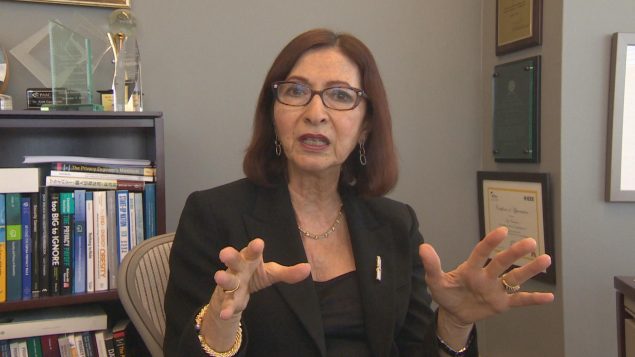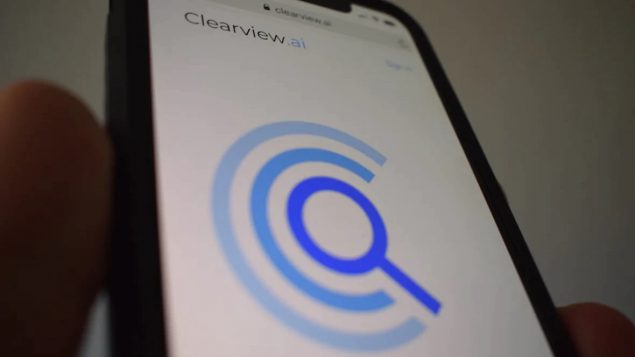Privacy advocates in Canada are welcoming the decision by the U.S. company Clearview AI to stop offering its controversial facial recognition software to Canadian law enforcement agencies.
A statement issued by the Office of the Privacy Commissioner of Canada said Clearview AI had advised officials of the decision in response to an ongoing investigation by the privacy authorities of Canada, Alberta, British Columbia and Quebec.
In its announcement Monday, the federal privacy commissioner’s office said the joint investigation with the four provincial privacy authorities into Clearview AI would remain open and that “authorities still plan to issue findings in this matter given the importance of the issue for the privacy rights of Canadians.”
Ann Cavoukian, a former Ontario privacy commissioner, said she was “absolutely delighted, because they should have never been doing this in the first place.”
‘It’s completely unacceptable’

Ann Cavoukian, a former Ontario privacy commissioner who now serves as executive director of the Global Privacy and Security by Design in Toronto, urges Canadians to use the built-in privacy settings when posting images on social media. (CBC)
“I applaud the federal privacy commissioner for basically laying down the law and saying, ‘You can’t do this in Canada!'” Cavoukian, who now serves as executive director of the Global Privacy and Security by Design in Toronto, told Radio Canada International.
Cavoukian said Clearview AI are using facial images obtained from social media without any consent from users who uploaded those images.
“When people put their facial images on social media, they do it to share with friends and family, they don’t do it to make it available for a company like Clearview AI, who then sell it to law enforcement,” Cavoukian said. “It’s completely unacceptable, unauthorized and should never have happened.”
Clearview AI says its software searches the open web.
“Clearview AI does not and cannot search any private or protected info, including in your private social media accounts,” the company says on its website.
“Clearview AI is an after-the-fact research tool. Clearview AI is not a surveillance system and is not built like one.”
Protecting privacy on social media
Canadians and other social media users must be very careful about what and how they post on their social media accounts, Cavoukian said.
“Unfortunately people don’t understand that while their intention may be that these images will only be shared with family and friends, the reality is it could be scooped off this way of social media by a vast number of entities,” Cavoukian said.
“I always tell people, you know when you’re on Facebook, believe it or not they have privacy by design on Facebook, you have to find it and once you do, you can have very strong privacy that restricts access to your information and facial images to the restricted number of people you indicate.”
However, most people don’t do that, she said.
“I’m urging people to take additional measures to protect the personal information that they do share on social media,” Cavoukian said. “You can do it, you just have to take a few steps to find those privacy protective measures and then take action.”
Changes to privacy legislation sought

Canada’s Privacy Commissioner Daniel Therrien waits to appear before The International Grand Committee on Big Data, Privacy and Democracy in Ottawa, Tuesday, May 28, 2019. The federal privacy commissioner says U.S. firm Clearview AI will stop offering its facial-recognition services in Canada in response to an investigation by the commissioner and three provincial counterparts. (Adrian Wyld/THE CANADIAN PRESS)
A number of companies and states in the U.S. have banned facial recognition, which could have rates of false positives of up to 82 per cent, Cavoukian said.
“It shows how sensitive facial images are, they are the most sensitive personal information in existence, your biometric, which identifies you,” Cavoukian said. “We have to start addressing these issues and modifications to legislation would be a good start.”
In Canada, the federal privacy commissioner has been seeking an update to the Personal Information Protection and Electronic Documents Act (PIPEDA), which covers how businesses handle personal information, Cavoukian said.
“Trudeau has not moved on it unfortunately but with any luck we’ll get some new changes now that it’s a minority government,” Cavoukian said.
What the federal privacy commissioner is seeking are changes to the legislation that would allow people to say no to their facial images being used without their consent, she said.
The federal privacy commissioner also seeks changes that would incorporate “privacy by design” into PIPEDA, Cavoukian said.
“One of the essentials of ‘privacy by design’ is the privacy as the default setting, which means you can only use the information you’ve obtained for the primary purpose that was consented to,” Cavoukian said. “Beyond that you cannot use it for any other purpose unless you go back to the data subject and obtain their additional consent. It’s a win-win.”
In practice, this would mean that no third party would be able to access the image without the consent of the individual involved, Cavoukian said.
“They couldn’t just grab the facial image and use it,” Cavoukian said. “No! They would first need to obtain the data subject’s positive consent to use that.”
Similar privacy by default rules are already part of the new EU legislation, the General Data Protection Regulation, she said.
Threat to privacy from pandemic emergency powers
Cavoukian says what keeps her up at night right now is the potential for the abuse of power by various of levels of governments when it comes to personal privacy because of the use of emergency powers to battle the COVID-19 pandemic.
These emergency powers allow the various levels of government greater use of data, she said.
For example a person’s COVID-19 status could be used for a variety of unrelated purposes, she said.
“Of course, they are now talking about ‘immunity passports,’ which they are introducing in the European Union,” Cavoukian said. “This is a nightmare because additional medical information may be added to that in the future.”
It’s a very slippery slope for personal privacy protection, she said.
“They would start with some small measure and then it grows and expands, and it ends up detailing and tracking an individual’s activities and conditions, this could become a tool for surveillance,” Cavoukian said.
With files from Thomas Daigle of CBC News







For reasons beyond our control, and for an undetermined period of time, our comment section is now closed. However, our social networks remain open to your contributions.